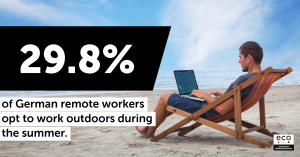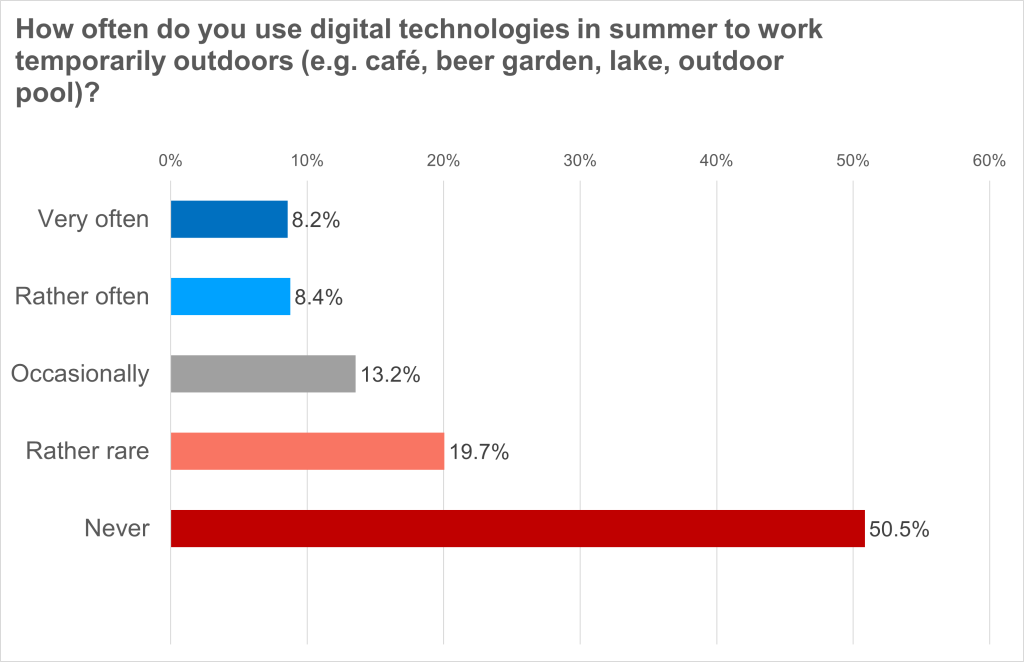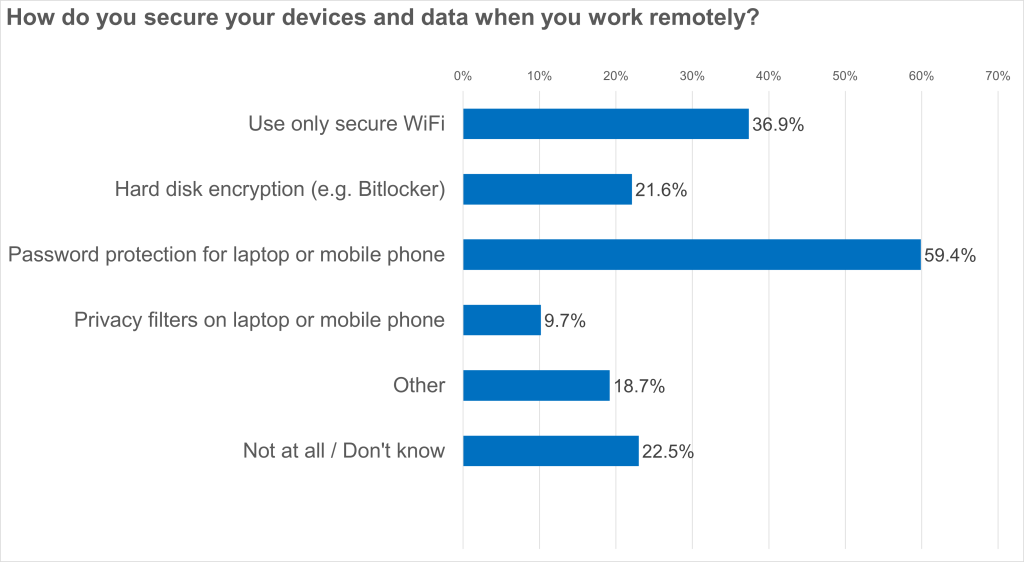- 29.8 percent of Germans who are able to work remotely use digital technologies to work in places such as cafés, beer gardens, open-air swimming pools or at the lake in summer
- Most show awareness of IT security: 59.4 percent secure their laptop or mobile phone using password protection, for example
- eco Association gives 7 safety tips for mobile working in summer
A laptop, tablet or mobile phone with an Internet connection is sufficient for being productive in various locations such as a café, beer garden, outdoor pool or at the lake. During summer, approximately one third of Germans who have the option of working remotely take advantage of this opportunity. According to a Civey survey commissioned by eco – Association of the Internet Industry, 29.8 percent of respondents move their workplace outdoors, with 13.2 percent occasionally working away from home and 16.6 percent doing so frequently. The survey involved approximately 1,000 individuals who had the option to work remotely.
When working outdoors, work equipment faces more risks compared to work from home. In addition to weather-related concerns and the risk of equipment theft, there are also cyber threats that exist in insecure Wi-Fi networks. However, most individuals take precautions to protect their devices and data when working on the go. Almost two-thirds (59.4 percent) have implemented password protection for their laptops or mobile phones. Additionally, 36.9 percent only use secure Wi-Fi networks, and 21.6 percent use hard disk encryption.
Protect sensitive information in the open air
It is essential to protect sensitive information when working outdoors. Markus Schaffrin, Head of Member Services at the eco Association, emphasises that digital technologies enable people to work from anywhere, and during summer, more individuals are opting to be productive outdoors while balancing work and leisure. Schaffrin believes that working remotely in locations like cafes or at the lake increases satisfaction, motivation, and identification with the employer.
If employers allow their employees to work outdoors, they should also educate them about the IT security risks involved. “Devices can be stolen and information and data can be spied on. Especially if sensitive information is lost, the damage to the company can be enormous. Markus Schaffrin therefore gives 7 tips for secure mobile working:
- Set up password protection on laptops and use a screen lock on tablets and mobile phones to prevent unauthorised access. Use strong, cryptic passwords or biometric features such as fingerprint or facial recognition. If possible, activate two-factor authentication.
- Avoid open or insecure WI-FI networks in public places such as cafés, restaurants or beer gardens. If uncertain, rely on the mobile phone network, which you can also use on your laptop via a WI-FI hotspot on your mobile phone, for example.
- Encrypt your devices and the data stored on them to enhance security against unauthorised access. Common operating systems offer build-in functions that can be easily set up. Alternatively, Specialised encryption software is available.
- Use a VPN connection (Virtual Private Network) for secure remote access to your company network at any time.
- When working remotely, the same applies outdoors: Do not open any suspicious emails, attachments or links from unknown senders. Cybercriminals are looking for vulnerabilities to install malware or ransomware (blackmail Trojans) via phishing emails. Regularly scan your devices with an up-to-date antivirus programme.
- Protect your devices from prying eyes by using privacy filters. Do not hold meetings on sensitive topics in public areas places where others may overhear. Refrain from mentioning names or confidential information in conversations.
Lock your device whenever you step away, even for a short time, or keep it out of sight. Never leave your devices unattended. Disabling USB ports and other inputs prevents cybercriminals from surreptitiously installing malware on your computer.
Download Grafik 1
Download graphic 2
Download Photo of Markus Schaffrin, Head of Member Services at eco – Association of the Internet Industry.






